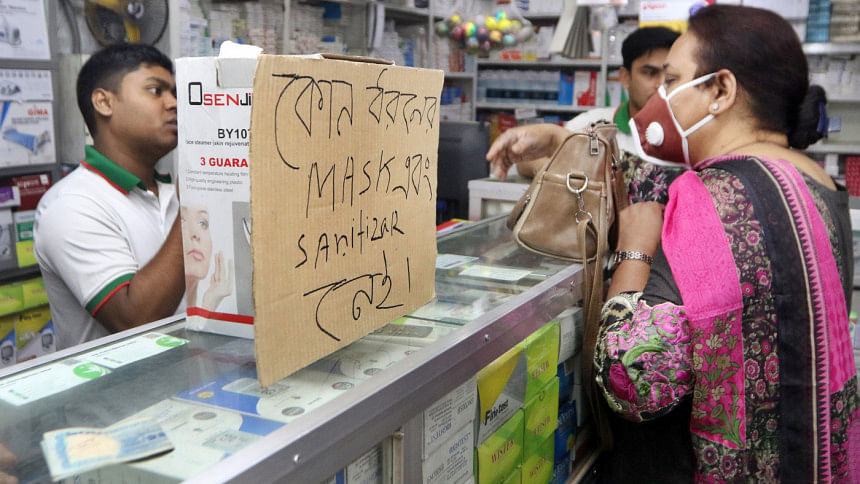Masks, handwash: leave some for everyone

Global health experts have warned against hoarding masks, handwash and sanitisers as it could make an outbreak situation worse by depriving those who might need it.
Despite this, panic-buying of these products in Dhaka has been triggered by news of the first confirmed coronavirus cases in the country.
Across the capital, several pharmacies and superstores have been facing a shortage of masks, antiseptic liquids and sanitisers since yesterday afternoon. The demand for tissue papers has also almost doubled overnight, some retailers claimed.
Many of the retail stores, super shops and pharmacies in Karwan Bazar, Moghbazar and Farmgate area have already run out of some of the products and many are facing shortages of handwash and antiseptic liquid.
"I had more than two dozen handwash refill packets and bottles, but all of those were sold out within a few hours yesterday afternoon," said Habibur Rahman, a retailer in Moghbazar.
"The people who used to buy one refill packet of handwash at a time, are now buying four to five. It may cause a price hike of these products," he said.
Mostafizur Rahman Sikder, a pharmacy attendant in the city's Tejturi Bazar, said panic-buying would cause an artificial shortage of these products.
"We ran out of masks and hand sanitisers yesterday evening. We have a few packets of handwash and antiseptic liquid. These are very necessary. How are we going to meet people's demands, particularly of those who are unwell?" he wondered.
Many -- buyers and sellers alike -- blame a group of people who are buying more of the products than necessary, leading to a hike in prices.
Mohammad Mehedy, a shopper in Farmgate, said he had to buy a mask at Tk 150, which cost about Tk 20 to 30 before.
"I needed it badly for my child. That's why I bought it. I urge people not to buy such necessary products in large numbers," he said.
Another shopper, Riyadul Islam, said, "We are responsible for the shortage. We wouldn't have faced this situation if some people didn't buy more than necessary."
Ghulam Rahman, president of Consumers Association of Bangladesh, however, said the crisis was not only down to the buyers, but also dishonest traders, adding some were taking advantage of the current situation to hike prices and make extra profits.
He urged the government to take tough measures against this.
Against the backdrop, a group of black-marketers have become active in the city's wholesale medicine markets in Islampur, Babubazar and Mitford area.
Wholesalers said a group of dishonest traders, with help of some brokers, are running the black market to make extra profit.
"Some traders tell their customers that they ran out of masks and hand sanitisers, but they sell those at two to three times higher prices in the black market in the evening," said Nurul Alam, a medicine shop owner in Islampur Road.
This newspaper also found some pharmacies putting up signs saying they have no masks to sell.
A mask trader of Amin Market in Babubazar area said that wholesale rate of a face mask was Tk 1.40, but it was now being sold for Tk 5 per piece -- rising to Tk 40 at the retail level.
Considering the situation, Directorate General of Drug Administration (DGDA) this afternoon held a meeting with medicine manufacturers and marketers to maintain the supply of the necessary cleaning materials and control the prices.
During the meeting, they decided to take legal actions against those who would sell hand sanitisers at higher prices and directed retailers not to sell more than one piece at a time.
They also directed the manufacturers not to provide their distributors more than 500 pieces of the sanitisers at a time in one invoice, and decided to publish the fixed retail prices of the materials in national dailies.
Around 3pm today, the Directorate of National Consumer Rights Protection (DNCRP) temporarily shut down two medicine shops in Gulshan for hiking prices of masks and hand sanitisers.
"These shops were selling masks at Tk 200 to 230 each, whereas the actual price is about Tk 50," said Monjur Mohammad Shahriar, deputy director of DNCRP.

 For all latest news, follow The Daily Star's Google News channel.
For all latest news, follow The Daily Star's Google News channel. 



Comments